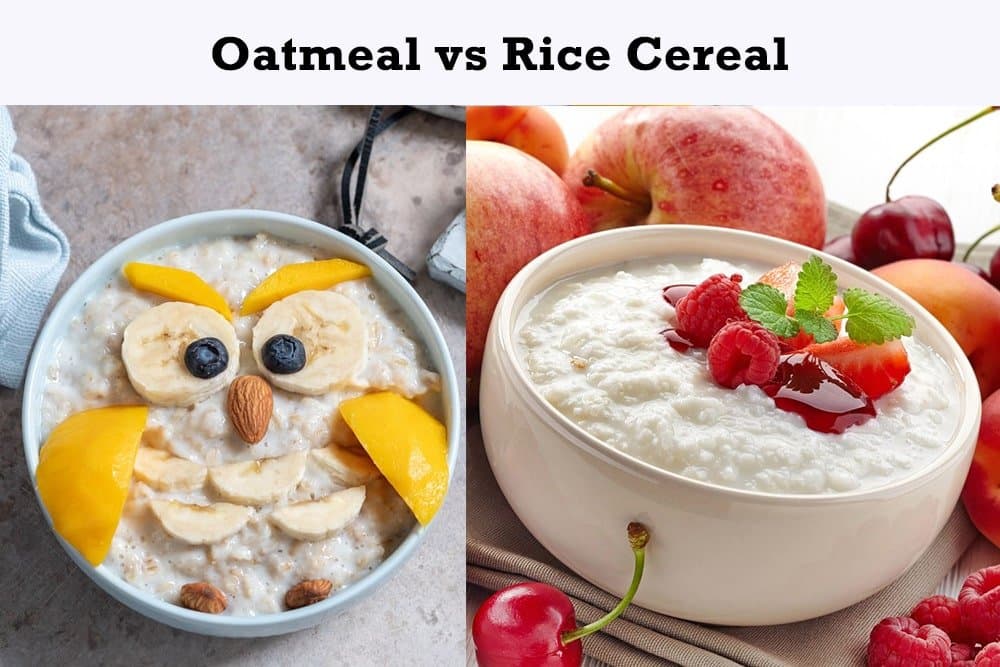
Table of Contents
The transition from breastfeeding to solids is a huge step in a baby’s feeding routine. Yes, it can be nerve-racking, what do you feed them, what is the right consistency, does the meal have the right amount of nutrients, questions and doubts regarding this are countless. As we are introducing a new substance into the baby’s system, it is always advised to opt for a single grain cereal to let the baby’s system adapt to dietary changes.
There are multiple options under single grain cereal available in the market, but in-depth research is a must before you choose the first meal for your little one. Oatmeal vs rice cereal for babies are two of the most common option alternatives debated due to their nutrient-rich profiles. Its mild flavors are also a reason why it is the top choice of transition food. Oatmeals are made of oats and rice cereals are made of fortified rice. While both are of good nutritional value, both have different nutritional profiles.
Now, how we make the right choice between rice cereal vs oatmeal cereal for babies is of debate.
Oatmeals for babies
Oatmeal is rich in fiber, antioxidants, vitamin A, Bs, and protein. It is also a good source of fortified iron, a nutrient that is lacking in their diet. Consumption of a quarter cup of oatmeal can provide up to 80% of the iron requirement. Oatmeal is also one of the few grains that are gluten-free and rich in micronutrients such as zinc, copper, and magnesium. These nutrients are extremely important for the growth and overall development of young ones. The anti-inflammatory properties of oats are also an add-on.
Oatmeal cereal is capable of improving gut health and is lighter on the digestive system of the little ones with soluble fibers. The soluble fibers relieve the baby from constipation. It keeps the baby fuller for longer too, helping in a better sleep cycle.
Rice cereals for babies
Rice cereals are a high-calorie meal choice that gives your tiny tots. This meal can cover their energy requirement for the day as 100 grams of rice cereal has up to 83 grams of carbohydrate which is the main source of energy. Rice cereals, in general, have a bland taste and this can be easily modified with the addition of salt or sweeteners. Brown rice is chosen over white rice for its better nutritional value and presence of vitamin Bs.
Now that we have seen the basic nature of both, let us compare these to meal ideas.
Oatmeal vs Rice Cereal For Babies
While both the options are devoid of strong flavors, rice cereals come across more as bland while oatmeal has a nutty taste to it. Rice cereals are rich in carbohydrates but when compared to the nutrition profile of oatmeals, it lacks micronutrients and iron content. Oatmeal is also rich in protein essential for the development and growth of young ones.
Oats naturally are gluten-free, but there is a high possibility of gluten contamination while processing and packaging. Arsenic contamination is similarly common with rice cereals. Both the elements, gluten, and arsenic are allergy triggering components. But research shows the chances of an allergic reaction are negligible in the case of rice cereal compared to oatmeals. Kids tend to develop allergic reactions to oatmeals often, hence it is necessary that you monitor the baby after the first bite is fed.
Both the meal options vary in texture. While oatmeals are slightly towards the heavy texture, rice cereals are smooth in texture. Acidic reflux is a common condition seen in babies. The thicker texture of oatmeals helps in reducing acid reflux in babies and holds the food down in the stomach. Rice cereals are on the heavy side of calories as a meal, it also tends to induce constipation, if the baby is fed frequently with rice cereals. Whereas the high soluble fiber content in the oatmeals relieves constipation and aids in better digestion.
These are the points of similarities and differences when it comes to the oatmeals vs rice cereal for babies debate. But it is necessary to monitor and understand how your baby reacts to these meals, as one meal does not fit all requirements. Over time feel free to tweak it a bit with the addition of boiled and smashed fruits and vegetables. This enhances the taste and nutritional value of the meals. Make sure that your repetition of a single meal does not take away important nutrients from your child, interfering with their growth and development.
You have to keep in mind that the meal you are serving your baby is totally new to these meals with respect to texture, consistency, and taste. Hence adding breastmilk or formula is a way to familiarise them with the food items. Another step towards easing solids into the routine is by setting a schedule for the meals. In the initial days, it is advised to feed them with two to three spoons of solids per meal and slowly build the serving and frequency. This will help them transition into solids without any fuss.
Oatmeal vs Rice Cereal For Babies Final Conclusion
As parents of young ones, we know that you want the best for your child. But you learn only from your mistakes so trials and errors are bound to happen. Each child is unique, their needs are unique. So a general guide can only direct you, further each step must be taken as per your child’s reaction to it. Trust your gut!
Here is a comparison table to summarise the nutritional value, so you can choose the best from oatmeal vs rice cereal for babies.
Qualities | Oatmeals | Rice Cereals |
Taste | Nutty | Bland |
Micronutrients | High | Low |
Ease of digestion | More | Less |
Texture | Heavy | Smooth |









